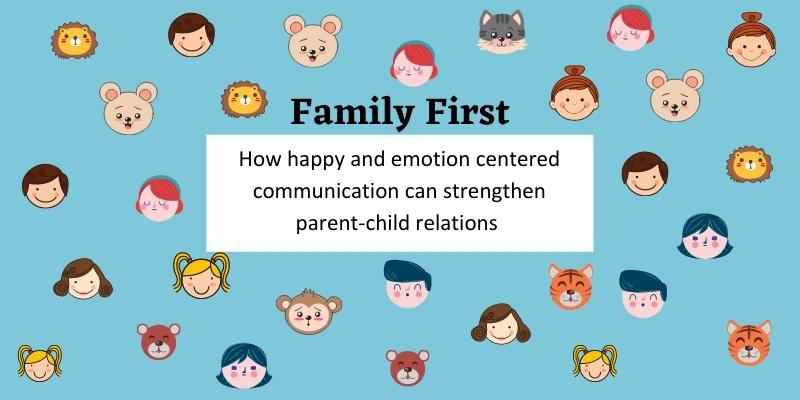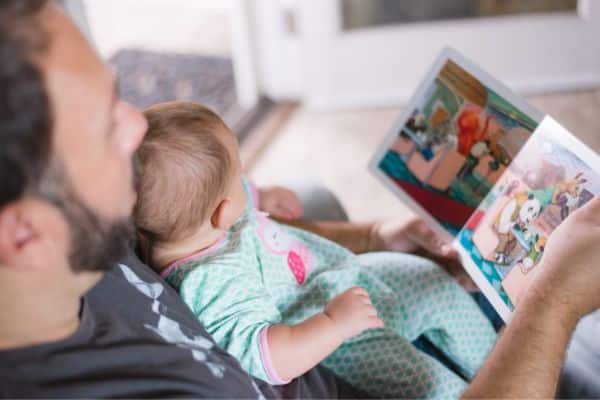Have you ever had a parent withhold permission for going out without giving any explanations?
Been yelled at for misbehaving even though all you wanted was to have a conversation with them?
That’s unhealthy communication in a nutshell.
Trying to get your point across to a parent can seem impossible at times. But with the right tact and professional intervention, the parent-child relationship can be smooth sailing.
What Does Parenting Mean?
Simply put, parenting is the act of raising a child, catering to their physical, emotional, and personal needs by providing them with a safe environment to nourish in.
No single set of instructions are sufficient to ensure the success of parenting. It comprises an entire process, unique to each parent, which they must carry out from the moment their child is born and until they reach adulthood.
We can assess each parent’s individuality by keeping in mind the parenting styles given by an American psychologist Diana Baumrind. She proposes four types, ranging from the characteristics of responsiveness to demandingness.
Responsive parents are sensitive to their child’s needs, provide support and security, allowing them to become independent and well-nurtured. Demanding parents require obedience and maturity, raising the child according to set rules and principles.
Based on these grounds, the styles are as such:
- Authoritarian: Authoritarian parents are high in demandingness and low in responsiveness. They raise obedient and rule-abiding children who lack social competence.
- Authoritative: Overbearing parents are highly responsive and demanding. They collaborate with their children to create an emotionally sound bond. Such children are socially competent.
- Neglectful: Such parents are low in demandingness and responsiveness. They neglect their children’s needs and raise socially incompetent children who lack self-control.
- Indulgent: Indulgent parents are high in responsiveness and low in demandingness. They spoil their children excessively, fulfilling all their needs in the absence of restrictions. Such children are also socially incompetent, lacking self-control.
These styles do not follow a ‘one-size-fits-all’ arrangement. Parents can shift between different parenting styles according to the social situation and in alliance with their cultural norms.
Arguably, the process of parenting is lifelong. This role does not diminish once a child becomes independent or self-sufficient. Instead, it evolves to accommodate what the child requires at any given age.
How Does The Role Of A Parent Change In Life?
A series of factors work together to make an effective parent-child relationship.
Parents satisfy their children’s bodily needs, education, and emotional support through various phases of life. Parents adapt their role to fit the needs of their child.
Age helps determine the role of parents by dividing it into several periods:
1. Infancy (Birth – 2 years old)
Parents of infants experience a variety of changes in their lives.
Whether the new parent is part of a married couple or striving as a single parent, their life will change drastically.
Parents of infants must focus first and foremost on developing a secure sense of attachment with their babies. Attachment refers to an emotional bond between parent and child. Nurturance and timely attention by parents help to build the emotional bond.
Infants become attached to the caregivers who fulfil their physical needs like being fed, receiving a response to their cries (being able to distinguish an angered cry from a hunger cry), keeping them clean, and becoming a source of comfort and love.
Another vital aspect is scaffolding. Scaffolding is parents taking turns to interact with their child or infant to ensure they grow up comfortable with both parents instead of only being attached to their mothers like before.
2. Childhood (2-11 years)
Childhood is a time of constant growth for both children and their parents.
Children experience physical changes such as controlling their bodily movements, social changes, and cognitive changes like learning languages, attending school, etc.
Throughout these changes, parents remain constant support in the child’s life. They act as facilitators and role models for the child’s social interactions.
Children will make friends and join peer groups that are similar to the peer groups of their parents. The parents’ religious and social communities will form the pool of social groups their children interact with.
The Social Learning Theory presented by Albert Bandura sheds light on this aspect of child development. Bandura believes that observing parents’ and peers’ actions allows a child to acquire new information and learn from experience.
Thus, childhood is a period of immense learning. A stable relationship between the parent and child during this period allows for sound emotional regulation throughout life.
3. Adolescence (12 – 20 years)
Widely believed to be a ‘rocky road,’ adolescence characterizes some significant parent-child paradigm changes. There may be clashes and confusion in the beliefs and goals of parents and adolescents. For example, some parents may not believe in hair colour, and their teenagers believe in only colouring their hair.
Adolescents experience confusion about their identity and roles, best explained by Erikson’s psychosocial development theory. This theory labels adolescence as a period characterized by identity vs role confusion.
The confusion entails teenagers searching for their true identity followed by a conflict leading up to its achievement.
The parental role has now significantly evolved by the time their children have become teenagers. Teenagers would want their parents to provide emotional support and do not like being told about most things in life. Parents believe it’s essential to impart learnings from their experiences, and adolescents think they need to learn from their own experiences. And this can bring in clashes and conflicts.
Due to an overwhelming influence of peers and the need to prove oneself in their eyes, adolescents will distance themselves from their parents and become independent.
Parents now need to provide emotional support and open communication channels as friends to ensure the bonding with their grown-ups is not impacted. Being friends help the conflicted teenager not to shy away from parental contact.
As a counsellor, I notice many parents seeking family therapy when they have adolescents. The conflicts between beliefs and communication gaps can give rise to stress, anxiety and an environment of silence or always hearing loud noises at home.
Family therapy or relationship therapy helps to build communication between parents and their children. Further in the article, we will learn about how therapy can help with making positive bonds.
4. Adulthood (20 years – Onwards)
During this phase, the once dependent child has now matured into a self-sufficient adult, capable of making their own decisions.
The parental role as a supervisor takes a backseat. Parents need to be an advisor or a guide.
As the new adults advance towards beginning their careers, moving away from home, and starting their own families, they often fall short of the expectations these roles require. Parents come in as saviours and share their experiences to facilitate the young adult in adapting.
However, I have noticed many times; parents are not able to let go of their control. They still consider the young adults to be children and expect them to toe the line.
Parental control is again another reason for some major conflicts. Counselling helps build communication between parents and their children.
Empty-Nest Syndrome
Many parents experience grief when their children leave home. This is called an empty-nest syndrome. Empty-nest syndrome or the emptiness inside could lead to emotional issues like anxiety, stress, depression and more. It may be essential to monitor self and family members and give them the emotional support required.
Sometimes, therapy can help manage and cope with these feelings of sadness, loneliness, grief, depression, anger, frustration when their children have left the nest. Therapy can help parents to mentally reconstruct their relationship with the children and view their absence positively.
There are many ways to cope with empty nest. Usually, a working parent or parents actively occupied will be less impacted psychologically by this syndrome. Parents can initiate activities like spending more time with their friends, indulge in activities with their spouse, and acquire a late age hobby to keep themselves busy for their well-being.
When I was growing up, empty nest syndrome was not common in my country, India. Nowadays, people can move to different parts of the world, which has increased the chances of being separated from children.
My mother experienced an empty nest when I moved to Singapore and my sister to the USA. Besides the psychological issues, there was a social shame in India of staying alone. She had to deal with her loneliness. She managed to cope well by keeping herself busy. She became a match-maker. She enjoyed meeting people, so her network of friends grew. She became part of her society’s committee team. She started to laugh and be happy.
Late Age Parenting: How To Bond With Children In Your 70s?
Children eventually grow up to get married and have their kids, and parents now become grandparents. If they stay close to their children, they can assist with childcare, babysitting, and parenting tips.
Grandchildren can be instrumental in forging new bonds within the family.
Many times, children may not marry or don’t have children. Children who are now grown-up adults may be occupied in their careers and may or may not have time to visit their parents.
It’s a good idea to have bonding activities like once-a-week family dinner. I know of many families who meet to play mahjong once a week. They may go for vacations together or plan movie nights etc. Since I stayed in a different country, I ensured I spoke to my mother every day. I would arrange to fly to meet her at least once in six months, or she would visit me.
What are some activities that help you bond with your parents?
At this age, parents may become irritable and may have lost their partner.
The parents’ efforts to develop a relationship with their child comes full circle, as the child assists them through their difficult period and becomes a source of support.
Children now become parents to their parents. Frequently, children take responsibility for their parent’s well-being.
Late age especially comes with its fair share of illnesses and disabilities. People above the age of 60 often fall prey to cardiac arrests, nervous disorders, and muscular pains. Another critical illness that may be difficult for caregivers to cope with is Dementia and Alzheimers. Dealing with these issues alone can become a burden for parents and their children. It can be an emotional as well as financial worry.
What Helps a Parent Bond with Their Child?
Bonding between parents and children comprises a history of shared experiences and feelings.
A primary caregiver is the child’s first emotional encounter with the world. The strength of this bond lies in how the child is raised. Attachment is of particular importance in developing an emotion-centered bond.
Mary Ainsworth’s Strange Situation has studied the role of attachment in the parent-child bond, whereby toddlers are placed in a room with a stranger for a short period and then joined in by the caregiver. Based on the toddlers’ reactions, four types of attachment styles have come forth.
Of primary significance is the securely attached bond. Parents are sensitive to the child’s needs and respond appropriately to their cries, resulting in confident and psychologically stable children later in life.
Following are some simple practices that can help parents bond with their children:
- Engage In Physical Affection
Whether it’s a goodbye kiss or a hug when they’re sad, physical touch can greatly promote love among parents and their children.
- Shared Activities
Take your children out to see their favorite movie, give them a tour of your workplace, take them on a yearly family vacation. All these activities will make parents and children active parts of each other’s lives and help secure a bond.
- Cooking Or Eating Together
Sharing a meal is the purest form of showing someone you care. Make your kids the prominent characters during your meals. Exchange stories, tell jokes and make your dinners fun.
- Don’t Let The Mess Scare You
Children aren’t as nimble as adults. They’ll make plenty of horrors before getting things right. Allowing children to learn from their mistakes instead of reprimanding them will promote trust and learning.
- Be A Collaborator, Not A Dictator
Children often come up with crazy ideas and ways of doing things that will surely end up in disaster. When that happens, let them do their thing. In fact, try to actively take part in their activities. This will make your children see you as a friend rather than an authority to be feared.
What Role Does Communication Play in the Parent-Child Relationship?
Communication is a two-way process that determines the strength of a relationship. Good parenting is achievable for those who communicate with their children openly without censoring things.
Individuals raised in emotionally nurturing environments do not fear judgment and regularly engage in activities that strengthen their bond.
Ideal as it may be to have a strong connection with your child, it is not always achievable. As children and parents become busy with their lives, most relationships fall prey to neglect.
The emotion-centered nature of a successful bond can break once the parties involved stop conveying their true feelings to each other.
Especially in the absence of one parent from the picture, it becomes difficult to maintain contact and ensure effective communication.
Such is the case for children belonging to divorced or stepfamilies. These children must adjust to living with a single parent or a stepfamily, a circumstance that causes confusion for the child and may tether their attachment with parents.
Co-parenting stands as a solution to this problem. Co-parenting is the act of jointly raising a child despite disagreements among the parents. Divorced or separated parents put aside their differences and provide the child with a safe environment.
How To Improve Parent-child Communication?
Parent-child communication is a constant process in our lifespans, and one which you can maintain well by keeping some points in mind.
Therapy can be incredibly helpful for parents who want to become more effective in their parenting. Here are a few ways in which therapy can help:
- Provide Emotional Nurturance
Parents often forget that needs internalize as children age. A toddler needs to be played with, whereas a 5-year-old needs someone to hold a conversation. A child entering school requires someone who can guide them and confront their fears with them. Emotionally nurturing a child requires giving their emotions utmost importance. Allowing children to feel afraid, sad, angry, excited, and appraising those emotions, ensures that they never feel neglected.
- Listen To Your Children
Children become avid storytellers as they age. When imagination runs wild, so do their tongues, and talking becomes their favorite hobby. This is the stage where parents must put all else aside and simply listen. When they speak about their day or something they’ve experienced, giving attention to the child lets them know their parents are always listening. Paying half your attention or trying to cut their stories short can stunt their expression and damage communication. Instead, focus on completing the story with them, giving reactions when necessary, and asking follow-up questions to show your interest.
- Switch Your Phrases For More Appropriate Ones
Parents will remain a child’s role model until a certain age, and everything they say will be considered absolute truth. Parents must then bear caution with how they interact with the child. If kids say something which isn’t true, instead of saying “Don’t tell lies,” or “You’re making things up”, listen to their version of events. If wrong, simply tell them, “That’s correct, but you missed something with that story.”
Similarly, throw away words that insult the child: stupid, crybaby, fatty, shortie, bed-wetter, etc. They tarnish the child’s self-esteem and foster dislike for the caregiver.
- Address Misbehavior
Most parents are inclined to let their children fight amongst themselves or misbehave by ignoring them. Parents do so to show the child that any misbehaving won’t be effective in getting the child what they want. However, most children misbehave to gain attention. When such a circumstance arises, instead of ignoring them or starting an argument, tell the child that you will listen to them once they calm down. Afterwards, have a conversation with them about why they acted out and work towards resolving the issue.
- Normalize Apologizing For Your Mistakes
Everyone is prone to making mistakes. Regardless of your stand as a parent and elder, promote apologizing amongst your children by practicing it in front of them. Say things like, “I’m sorry”, “It was my mistake”, and “I’ll make up for it” without hesitation. Children will learn the importance of an apology and reciprocate it often. More than anything, acknowledge your mistakes to your children so they know that anyone who makes mistakes should apologize.
- Share And Show You Care
Children will only communicate with parents truthfully if parents do the same. Share parts of your day with your children, let them get to know you better, and allow them to share their life with you. Once they feel comfortable speaking to parents about routine matters, they will eventually share their problems and fears and make for proper communication.
- Speak At The Child’s Level
Know your child for their mental level and address them accordingly. Don’t use complex terms with children that only confuse them, and don’t reprimand teenagers like children. Always speak to them on eye level and use a warm tone to show them your consideration.
What Are The Most Common Parenting Mistakes?
Parenting is a full-time job, an aspect most parents don’t consider when stepping into this role. Believing that anyone can ‘learn to become a parent’ upon their child’s birth causes many complexities.
Being a job of such delicate nature, it requires knowledge and training, without which parents commit some common mistakes, such as:
- Falling Prey To Parenting Myths
Certain myths surround parenting and can cause immense harm. Some of these are:
- Childbirth can save a failing marriage.
- Children are extensions of their parents and should act, think and behave similarly.
- Having children in a marriage gives the parents a ‘second chance.’
- Parenting is an ‘instinct’ that needs no training.
All such beliefs are only myths, straying far from reality and capable of doing more harm than good.
- Moulding The Child’s Life As Parents See Fit
Children are often subjected to carry on family traditions and fulfil expectations like adopting a particular career or education line. When children fall short, their parents become disappointed in them. Such unrealistic expectations are unhealthy for the child and hinder the relationship.
- Not Setting Clear Boundaries
Parents who overindulge their children may fall for this mistake. Growing up without proper rules and distinct boundaries of what is permissible and not can cause children to grow up spoiled. Parents shouldn’t fear setting some regulations in the house. These will discipline children and teach them to be responsible.
- Giving Yourself Up For The Role
Parents who dedicate themselves entirely to their role cannot take care of themselves. Their mental peace becomes compromised, leading them to admonish children often and become overly strict. Children of such parents prefer to leave their home behind to move away from the toxic environment.
- Dismissing Children’s Feelings Or Hunches
Children are not the best at expressing themselves. Their words may fall short of explaining their feelings which parents end up dismissing. This creates barriers and hinders communication greatly, leading to emotionally unstable children who cannot articulate their emotions well.
Fixing Parenting Mistakes: Is Recovery Possible?
Contrary to popular belief, you can recover parenting mistakes from even much later in life. The wounds left behind from a tattered relationship may not go away completely, but time and effort can heal just about anything.
The first step would be to admit that a mistake has been made. Parents who do not shy away from apologizing can develop a good connection with their children at any stage in life. The key is to make the first move and be sincere with your intention.
Forgiveness takes time, and good parenting demands giving your child space. You cannot wash a life of emotional neglect away with one visit or hug. The parent must make continuous efforts to solidify their contact with the child and ensure that trust is established.
Parents who show sincerity by taking an active part in their children’s lives can move forward from their mistakes, ensuring they won’t repeat them. They can express sincerity by taking part in the child’s life and acknowledging their hurt.
A sure way to fix the broken relationship is by seeking parental therapy. Engaging in this act will improve communication between the parents and children, allowing each side to express themselves and finally move on.
How Can Counselling Help with Effective Parenting?
Parental therapy or counseling is the simple act of receiving some help in raising a child. The process may be short-term and involve promoting interactions between the parents, children, spouses, additional caregivers, close family friends, or just the parent alone.
Therapy aids in child-rearing. It is by no means an affirmation of perfect parenting or a securely attached parent-child bond. Through this exercise, a collaboration of sorts is achieved, and communication attains a smooth flow between the respective parties.
A prominent form of therapy emerging today is called Parent-Child Interaction Therapy (PCIT). This therapy is used to facilitate communication between parents and children with behavioral and learning difficulties. It works with each parent to strengthen the relationship with their child, build confidence, effectively guide and direct their child’s behavior, set limits, and restore positive feelings in their interactions.
Disorders like those on the autism spectrum (Asperger’s, Autistic Disorder), reading disabilities (dyslexia, dysgraphia), nervous conditions (OCD, PTSD) are prevalent among children today. According to a study conducted by the University of London, up to 10% of children suffer from these disorders.
PCIT aids in the treatment of these disabilities and many other behavioral problems in children which are more commonplace, such as tantrums, low temper, annoyance, vindictive nature, etc.
What Is The Secret To Being A Good Parent?
If you’ve made it this far into the article, this point shouldn’t be a mystery anymore. But just to recap how one can become a good parent:
- Prepare yourself for the role of parenting just how you would prepare for a job.
- Give yourself room to evolve, adapt and make mistakes.
- Learn from your mistakes, know when to apologize and how to avoid repeating errors in the long run.
- Communication is key. Think of your child as a companion and confide in them with honesty.
- Be aware of the developmental stage the child is in and deal with them accordingly.
Conclusion
No matter how old the child or parent is, make therapy a constant. It doesn’t have to exist only when there’s a problem. Instead, incorporating it from the beginning will allow a healthy relationship to nourish throughout life.
Book an appointment today and get started on the road to recovery.
Read our blog: 10 Powerful Insights into Your Teen’s Future Worries































